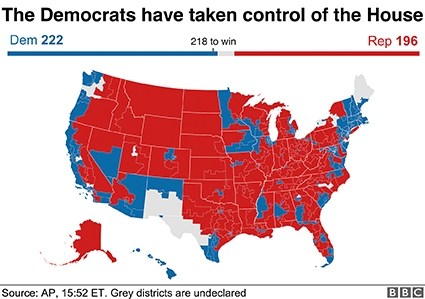US Elections Results Unlikely to Change Washington’s Stance on Russia & China
The US had its mid-term elections where the Democrats, after gaining control of the lower chamber of Congress, the House of Representatives, will likely to have a larger influence on both the foreign and domestic policy of the country. In the US political system, the executive branch - the White House - is dominant in the formulation and conduct of the US foreign policy.
At the same time, it is important to remember that the Democrats' victory in the House of Representatives is counterbalanced by the Republicans' domination in the Senate.
There is a possibility that this balance of power might create more confusion than any orderly foreign policy at a time when the US faces numerous challengers across the Eurasian landmass. That explains why the US elections were watched around the globe, with various analyses and forecasts made on the possible influence the results will have on relations with Russia, China and the European Union.
The Democrats are generally viewed as more moderate in their views on the necessity of active US involvement in the affairs of the Eurasian continent. Many will remember how Barack Obama’s foreign policy was less active following George Bush’s military campaign in Afghanistan and Iraq. However, even then, Washington’s policy did not alter drastically: they just became less militarily-dependent.
Nowadays, the US faces geopolitical competitors which are regarded by both Republicans and Democrats as real problems for Washington’s economic and military order in Asia-Pacific and Eastern Europe. Indeed, even before the elections, when the two chambers of Congress were largely under Republican control, the Democrats were united on the question of Russia’s annexation of Ukraine's Crimea Peninsula and fomented separatism in eastern Ukraine.
The Democrats and Republicans see that modern-day Eurasia is indeed more chaotic, and this unpredictability represents a marked break with what the US had to cope with in previous decades. In the more predictable Cold War era, geopolitics was important, but it was hidden under democratic and idealistic premises.
In modern Eurasia, though, there is a clear shift towards a new, more untenable world order. Take, for example, the new US national security document signed by President Trump. It has formally ushered in the end of ethical and moral grounds in international relations and heralded the return of geopolitics – a step rooted in the experience of past generations.
The Democrats, like their Republican counterparts, understand how dangerous Russia’s actions have become in the former Soviet space and Eastern Europe. It is important to remember that first and most important, anti-Russian sanctions were introduced under Democrat Obama, with the Trump government merely continuing the trend.
Beyond the immediate Russian security threat to its neighborhood, the US faces China, which aspires to change the existing political balance of power in their regions. China’s economic rise, coupled with its military development, has poised it to become a powerful world player in international politics. More importantly, its strategic imperatives clash with those of the US. Beijing needs to secure its procuring of vital oil and gas resources, which are currently available mostly through the Malacca Strait. In the age of US naval dominance, the Chinese imperative is to redirect its economy’s dependence as well as shift supply routes away from Malacca. This is the reasoning behind the almost trillion-dollar Belt and Road Initiative, which is intended to reconnect the Asia-Pacific with Europe through Russia, the Middle East, and Central Asia. At the same time, Chinese naval ambitions are on the rise to thwart US dominance close to its shores.
In addition, Iran’s growth of geopolitical capital through the chaos in Iraq and Syria makes it yet another competitor of Washington. The sanctions re-imposed by the Trump administration will likely stay untouched under the Democratic House.
Georgia, too, carefully watched the results of the US elections. In a time of high tensions with Russia, when the rhetoric in Georgia is overly anti-Russian, having Washington change its stance on Georgia would amount to a geopolitical weakening of Tbilisi’s position. But here, too, it is unlikely that any change would happen. Trump’s security advisor John Bolton’s recent visit to Tbilisi proved that it will be very difficult to change the existing pattern of American diplomatic and military support to Georgia.
By Emil Avdaliani
Image source: bbc.com












